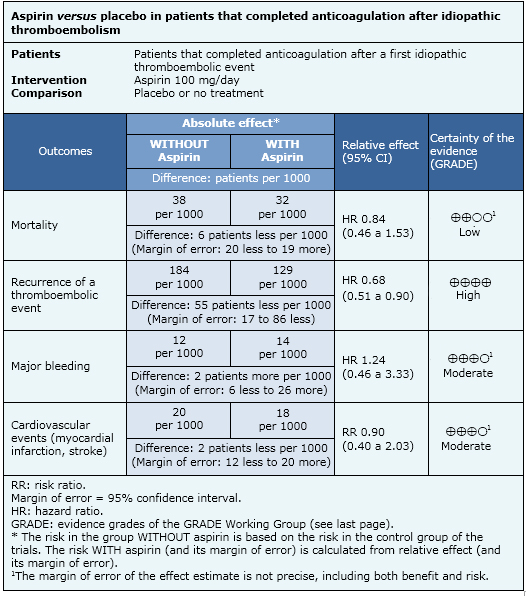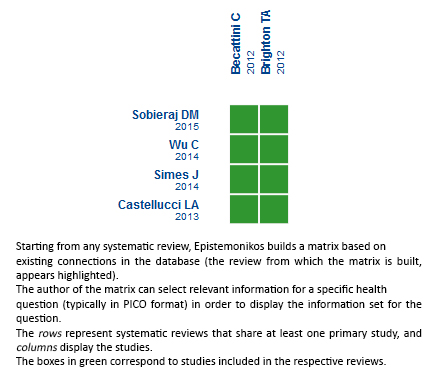Resúmenes Epistemonikos
← vista completaPublicado el 10 de abril de 2015 | http://doi.org/10.5867/medwave.2015.03.6118
¿La aspirina reduce la recurrencia de eventos tromboembólicos idiopáticos después de completado el tratamiento anticoagulante?
Does aspirin reduce recurrence after completing anticoagulant treatment for an idiopathic thromboembolic event?
Abstract
Idiopathic thromboembolic disease presents a high risk of recurrence. There is controversy about the effects of aspirin in reducing this risk after the completion of anticoagulant treatment. Searching in Epistemonikos database, which screens 30 databases, we identified four systematic reviews that together include two randomized trials. We combined the evidence using meta-analysis and generated a summary of findings table following the GRADE approach. We concluded that aspirin administered after having completed anticoagulation reduces the risk of recurrence, probably without importantly increasing the risk of hemorrhage.
Problem
Patients with idiopathic venous thromboembolism have a high risk of recurrence once anticoagulation treatment is stopped. These patients also have a greater risk of cardiovascular events compared with the general population (myocardial infarction, stroke). Use of aspirin could lower the venous and arterial thromboembolic risk without increasing the risk of hemorrhage. Current guidelines do not mention the role of aspirin as a secondary prevention strategy in these patients.
Methods
We used Epistemonikos database, which is maintained by screening more than 30 databases, to identify systematic reviews and their included primary studies. With this information, we generated a structured summary using a pre-established format, which includes key messages, a summary of the body of evidence (presented as an evidence matrix in Epistemonikos), meta-analysis of the total of studies, a summary of findings table following the GRADE approach and a table of other considerations for decision-making.
|
Key messages
|
About the body of evidence for this question
|
|
We found four systematic reviews [1],[2],[3],[4] that evaluated this question, which included two randomized controlled trials [5],[6]. |
| What types of patients were included. |
Patients with a first idiopathic thromboembolic event (deep vein thrombosis and/or pulmonary embolism) that completed initial anticoagulation (warfarin, low molecular weight heparin or new anticoagulants). |
|
What types of interventions were included. |
Aspirin 100 mg once daily for at least two years. |
|
What types of outcomes were measured. |
Thromboembolic recurrence; major vascular events (acute myocardial infarction, stroke); cardiovascular mortality; overall mortality; major bleeding; minor clinically significant bleeding. |
Summary of findings
The following information is based on two randomized trials that included 1224 patients.
- Use of aspirin after completing anticoagulant treatment decreases risk of recurrence, and probably leads to little or no increase in the risk of hemorrhage in patients with a first idiopathic thromboembolic event.
- Use of aspirin in these cases might lead to a mild reduction in mortality but the certainty of the evidence is low.

Other considerations for decision-making
|
To whom this evidence does and does not apply |
|
| About the outcomes included in this summary |
|
| Balance between benefits and risks, and certainty of the evidence |
|
| What would patients and their doctors think about this intervention |
|
| Resource considerations |
|
|
Differences between this summary and other sources |
|
| Could this evidence change in the future? |
|
How we conducted this summary
Using automated and collaborative means, we compiled all the relevant evidence for the question of interest and we present it as a matrix of evidence.
 Full size
Full size Follow the link to access the interactive version Aspirin for reducing recurrence after completing anticoagulant treatment for an idiopathic thromboembolic event

Notes
The upper portion of the matrix of evidence will display a warning of “new evidence” if new systematic reviews are published after the publication of this summary. Even though the project considers the periodical update of these summaries, users are invited to comment in Medwave or to contact the authors through email if they find new evidence and the summary should be updated earlier. After creating an account in Epistemonikos, users will be able to save the matrixes and to receive automated notifications any time new evidence potentially relevant for the question appears.
The details about the methods used to produce these summaries are described here http://dx.doi.org/10.5867/medwave.2014.06.5997.
Epistemonikos foundation is a non-for-profit organization aiming to bring information closer to health decision-makers with technology. Its main development is Epistemonikos database (www.epistemonikos.org).
These summaries follow a rigorous process of internal peer review.
Conflicts of interest
The authors have completed the ICMJE uniform disclosure form for potential conflicts of interest, (available on request from the corresponding author), and declare not having conflicts of interest with the subject of the article.

